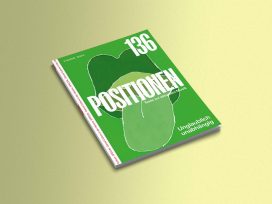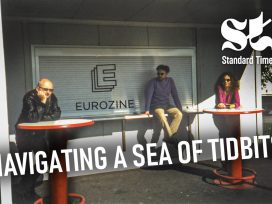Read Emrah Efe Çakmak’s interview with Mark C. Taylor: Forget journals!
Emrah Efe Çakmak: I would like to begin with the big picture, with the question posed to all contributors to this publication: “How much in common does a community need?”
Homi Bhabha: Well, first I think the question has to be reformulated. How much in common does a community need for what? The important thing is for what. If we are talking about a very diverse community, a community with great conflict within it, but whose members have a common love for sport, then during the Olympics or during football games on particular days or particular matches its members may well appear together despite their differences and despite their difficulties being together. At the same time the community that may represent a common front or a common faith in relation to sport may split terribly in relation to the distribution of particular kinds of resources, or indeed on the question of intercommunal or interfaith marriages. There is no general question of what a community needs in common. If you pose the question just generally, then you are tempted to revert to certain conventional or naturalistic ideas. Does everyone need to have been born in the same place, for instance? Does everybody need to have at least religious belief in common? Does a community need to be a proceduralist community, where, although it may have very different values, it at least believes in certain procedures so that it can interact and negotiate peacefully on a formal basis?
On the other hand, when the purpose of the community is, say, to produce a pluralist network of journals or other communicational media across Europe in which actors can speak to each other, can negotiate with each other, can have a lively exchange and a circulation of ideas and values, this would of course be very positive. I cannot see anyone saying this would not be a very positive move. But the question as to whether this could happen and what each institutional journal would have to have in common with the other institutional journals would really depend on what the specific issue that brought them together is. Is it about race or anti-racism? Is it about political democracy? Is the question of freedom the thing that these interventionist journals want to inspect? Do they want to make a critique of certain European Union policies on culture? Do they want to talk about the impact of globalization on regional cultures? It seems to me that on each of the things I have just mentioned there is the possibility that they might or might not come together. Who knows whether interventionist journals in France, for instance, would share with interventionist journals in Turkey the same thoughts on what it means to be a member of the European Union, or what the conditions of becoming a member should be? To begin with, each question would have to be posed as a general issue and then as a very specific issue depending on regional or national communities, and their ideologies, to see what it would take to bring them together.
EEÇ: Let me then take up the question of “what for” regarding the creation of a European network of cultural journals. Such an act of networking would seek to expand the European map as far as possible both linguistically and culturally in order to encompass the current European cultural scene; in this sense its horizon would be nothing but an expanded Europe.
HB: If you are talking about creating a kind of interventionist, cultural-activist, pan-European community of journals, then obviously the question of language and translation becomes very important. And there I immediately see two issues. One, if you have an expanded Europe of that kind, with its entire linguistic multiplicity and cultural diversity, and yet you emphasize French, German, and English, then the linguistic map looks rather like a kind of colonial map, a culturally colonial map. These were always the dominant languages: French was of course the great international diplomatic language of the nineteenth century, possibly even earlier; English was the other major language of international commerce and communication; German – I am being a little general here – was the language of nineteenth century European philosophy. I would say that even amongst those languages, English would dominate the others. There is a pragmatism and a realism about what you are suggesting, but to have these languages as the major languages of communication while at the same time redrawing the map of Europe creates an internal contradiction. I don’t know whether this is something you can actually do anything about, but I think you have to observe it, number one.
Number two: Why does Europe not extend to parts of Asia, for instance? After all, many of the debates and ideas of European liberalism were formed or emerged in communication with non-European countries and cultures in the colonial and imperial stage and even before that, even in the period of mercantilism. So it seems to me that if you are talking about expanding Europe – and we should be careful about that term itself because it seems to give Europe a kind of hegemonic place – but if you are talking about such expansion, or such expandability, then I think it is difficult not to think about this on a much more global scale. It is difficult not to suggest that parts of Asia and Africa, to say nothing of the Caribbean and Latin America, have been cultural sites that have contributed profoundly to the creation of the thing that we call Europe, both politically and culturally. John Stuart Mill’s great essay “On Liberty”, which in many people’s view is a classic articulation of European values, European polity, and European public ethics, was originally written in response to the problems of Indian education after Macaulay’s proposals for the reform of Indian education. So even a text like “On Liberty”, which is often thought to be the essence of European liberal thinking, or Euro-American liberal thinking, comes out of a profound and problematic conversation with India in the colonial period. It seems to me that once you start expanding the cultural and ideological and epistemological boundaries of Europe, you reach the Ganges, you reach the Nile, you reach Latin America, the Caribbean.
EEÇ: How about Europe then?
HB: Well, if you are interested in cultural and political issues, in cultural intervention and political activism, why should you be constrained by the term “Europe”? Whether Europe is a concept, whether Europe is an idea, whether Europe is a set of values, or whether Europe is a geopolitical entity… The territory of interventionist journalism or journals should be internationalist and should be based on the affiliations between communities of intellectuals or communities of activists who see the interconnectedness of the world not as some trendy issue of globalization but as a much older story that goes back several hundreds of years. So I don’t see why you need the concept of Europe to do the kind of very worthwhile cultural work of a pioneering journal or a pioneering set of journals. In fact, I think for a long time now a lot of philosophers and writers have been seeing Europe not as a kind of containing or constraining boundary but as a threshold to cross over intellectually, ideologically, ethically; we take Europe to be a threshold, to be a liminal territory to cross over onto other territories.
EEÇ: In relation to this worldly imaginary, how can we think about the relation between territory, nation and identity in a post-national world? Or rather, how can we engage with this relationship without promoting new identitarian politics?
HB: I think this is a very important and interesting question, and I think many writers and novelists have answered it. For instance, in the 1950s, the Caribbean novel was reinvented by a group of writers – George Lamming, Wilson Harris, V.S. Naipal, Sam Salvon – who all lived and worked, roughly, in a part of London not far from where I am speaking at the moment. They came here because the institution of literary and cultural production was not appropriately supported in the Caribbean at that time for economic reasons. So they were drawn to London where they lived very much, at least some of them, as minorities, the Afro-Caribbean minority. They took the English language and they gave it an Afro-Caribbean turn, they used the dialect, the patois, and they created these great works. All of a sudden a part of London, or London itself, or England becomes the territory for the invention or creation of Caribbean literature as we have inherited it now, and the very language of English is taken and transformed and culturally translated. You again have this happening with the boom of the post-colonial Indo-Anglian novel that started with Salman Rushdie for instance: again, funnily enough, in London. But the English language is taken and it is translated culturally, and these Indian writers used the mise en scène of urban Indian cities – whether it is Ricard Brouche, or Salman Rushdie, or Arundhati Roy. And then suddenly the territory of the “English novel” or “English fiction” explores or is located imaginatively in the landscapes of post-colonial India, and yet the literary production happens in England and the publishing institutions and the intellectual milieu become international. So you begin to see the cultural transformation of language and indeed territory, and no longer do you have a kind of pure or – as you put it – identitarian English culture organically emerging out of an English social territory. The whole idea of the organic relationship between language, culture, and the intellectual is disrupted.
So I give you an example of Caribbean literature in the 1950s; I give you the example of the Indo-Anglian novel in the 1980s; and then of course we now see this happening in France, where many of the most recent prizes for fiction have been given to the North African writers. Yet it is difficult to say, “Ah, this is Maghrebian, not Parisian.” The beauty of it is that the Maghreb finds its expression in the Parisian literary context, and the Parisian literary context is actually transformed by the Maghrebian experience. And this is, I think, what Walter Benjamin meant in his great essay on translation, “The Task of the Translator”, when he quotes Rudolf Pannwitz as saying that the important thing is not to make Hindi like German but to make German like Hindi. It seems to me that the impossibility today of clinging onto some organicist or identitarian link between culture, language, and territory is being demonstrated to us by what is happening in the world of writers, contemporary writers, or contemporary writing, and also in the intellectual issues that arise through writers. I can also give you examples of many artists who are in exactly the same position. That, I think, is the most concrete and the most far-reaching response to the question about the fate of some kind of identitarian, traditionalist view of the linkages between a “pure culture” and an unsullied geopolitical territory. These developments are not part of an organicist view of culture and language. It is a different model from the organic model that many literary historians wrote with, when they always taught that the English mind would in a way reflect English realities and came out of a British background and that the English language would be best represented by those who were steeped in British culture, British politics, and British history. The fundamental notion of literature – of the nationality of literature, of literature as having a nationality – has changed.
EEÇ: Do you think that the non-organic reality of contemporary literature could be a model for a project, or for a larger community of intellectuals and writers acting together?
HB: Oh, absolutely. I have just been in Bombay, which is the city of my birth. I find now that in Bombay there are writers and journalists and art critics who are able to do the work of cultural translation between European ideas and Indian artists, between Indian political problems and international legal and political issues.
Read Emrah Efe Çakmak’s interview with Mark C. Taylor: Forget journals!






